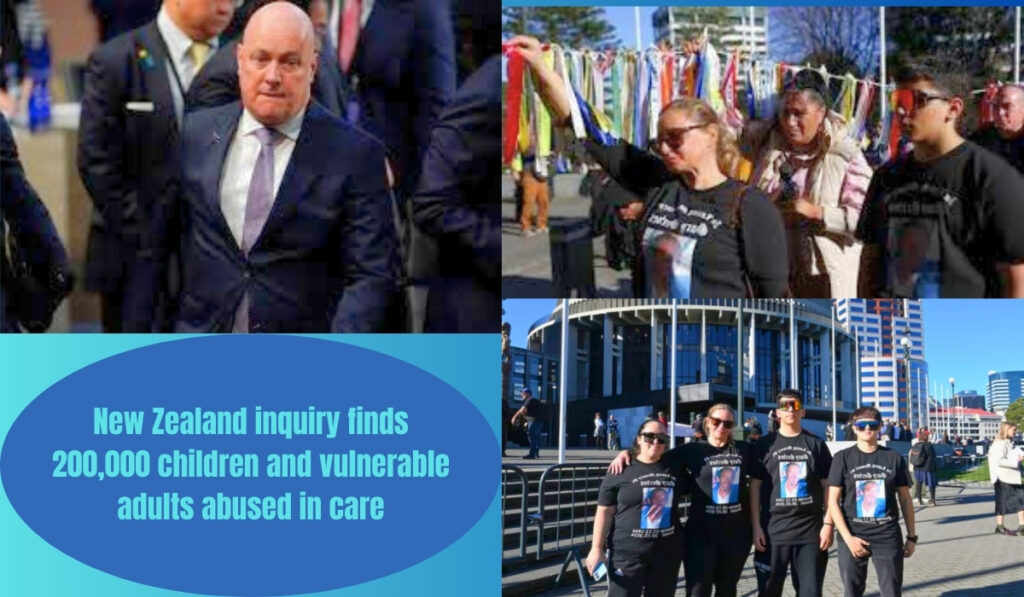Introduction
Inquiry about children and vulnerable adults abused in New Zealand. On July 24th, a public inquiry revealed that around 200,000 children, young people, and vulnerable adults were abused in state and religious care in New Zealand over the last 70 years. This shocking discovery has led to a public apology from Prime Minister Christopher Luxon and promises of comprehensive reforms.
Scope and Findings of the Inquiry
Scale of Abuse
The Royal Commission of Inquiry’s report indicates that nearly one in three individuals in care between 1950 and 2019 experienced some form of abuse. The inquiry’s scope was vast, involving testimonies from over 2,300 survivors, and it found instances of severe abuse, including rape, sterilization, and electric shocks, with the most incidents occurring in the 1970s.
Vulnerable Populations
Certain groups were particularly vulnerable:
- Indigenous Māori Community: Members of this community faced a higher risk of abuse.
- People with Disabilities: Both mental and physical disabilities made individuals more susceptible to mistreatment.
Cover-Ups by Authorities
The report highlights how civil and faith leaders often attempted to cover up abuses by relocating the perpetrators and denying any wrongdoing. Many victims died without seeing justice.
Government and Institutional Responses
Government Apology and Reforms
Prime Minister Luxon expressed deep remorse, stating, “This is a dark and sorrowful day in New Zealand’s history… we should have done better.” He announced that an official apology would be made on November 12 and committed to implementing reforms to prevent such abuses in the future.
Religious Institutions’ Responses
- Catholic Church: Acknowledged the abuse and stated they were reviewing the report to ensure appropriate actions.
- Anglican Church: Took full responsibility for their failures and promised to provide the safe, caring environment that was expected.
- Methodist Church: Expressed deep regret and thanked survivors for their courage in coming forward.
- Presbyterian Church: Committed to responding after a thorough review of the report.
Compensation and Redress
Financial Implications
The report did not specify the exact compensation amounts but estimated the lifetime cost of abuse for each survivor to be around NZ$857,000 (approximately $511,200.50). Prime Minister Luxon indicated that all out pay could run into billions of dollars.
Recommendations for Redress
The inquiry recommended:
- Compensation for Survivors: Fair payments for those who suffered abuse.
- Intergenerational Trauma: Payments to families affected by the trauma suffered by survivors.
- Review of Previous Compensation: Particularly focusing on cases like the Lake Alice adolescent unit.
Establishment of a Care Safe Agency
A significant recommendation was the creation of a Care Safe Agency to oversee care institutions, ensuring stringent measures to prevent future abuse. This includes mandatory reporting of suspected abuse, even if disclosed during religious confessions.
Public and Academic Reactions
Survivor Reactions
Survivors and supporters filled the public gallery in parliament as the report was debated. The emotional response included standing and singing an Indigenous Māori song about love and unity after Prime Minister Luxon’s speech.
Academic Perspective
Tracey McIntosh, a sociologist at the University of Auckland, emphasized the importance of recognizing and acknowledging survivors’ experiences, stating, “The most important element is to recognize and acknowledge the survivors for the reality and the truth of their lives.”
Conclusion
The findings of this inquiry mark a pivotal moment in New Zealand’s history, shining a light on decades of abuse and neglect in state and religious care. The government’s commitment to reforms and compensation, alongside the acknowledgment from religious institutions, aims to provide justice and healing for survivors and their families.
References
- Reuters, “New Zealand inquiry finds 200,000 children and vulnerable adults abused in care”
- Royal Commission of Inquiry, official report
- Statements from the Catholic, Anglican, Methodist, and Presbyterian churches

